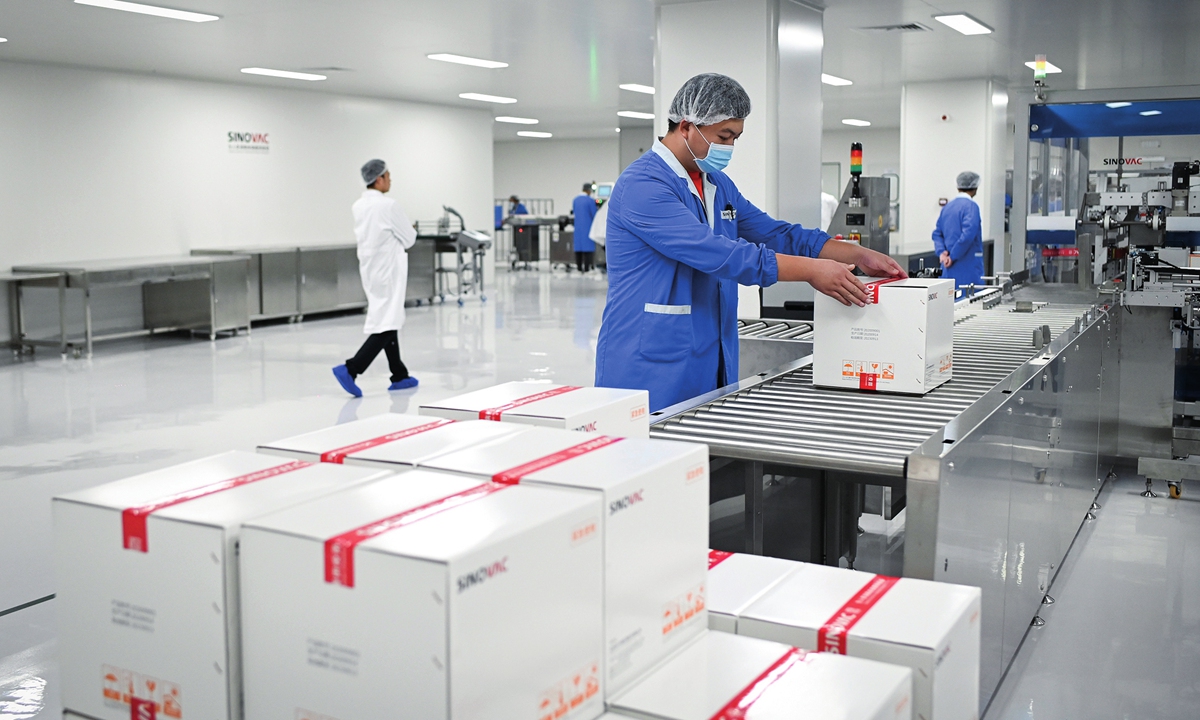Brazilian politics, US pressure likely behind Chinese vaccine's suspension: experts
By Xu Keyue and Hu Yuwei Source: Global Times Published: 2020/11/10 21:28:40
‘Domestic politics, US likely behind trial halt’

A staff member works during a media tour of a new factory built to produce a COVID-19 vaccine at Sinovac, one of 11 Chinese companies approved to carry out clinical trials of potential coronavirus vaccines in Beijing on September 24. Photo: AFP
The Chinese Foreign Ministry, the Chinese vaccine producer and a Brazilian institute clarified that Brazilian health regulator's decision to halt trials of a Chinese-produced COVID-19 vaccine in Brazil is not related to the vaccine itself, after foreign media said the suspension came following a "severe adverse event."
Chinese experts said politicization of vaccine issues by some Brazilian politicians was likely the reason. They said the vaccine trial issue, which is life-saving work amid the COVID-19 pandemic, should not be influenced by Brazilian political disputes or US pressure.
They stressed that the vaccine is essential to fight the virus, but the suspension without a reasonable excuse could slow down the vaccine-development process.
Wang Wenbin, spokesperson of the ministry, said at a press conference on Tuesday we notice that Butantan Institute, partner of China's Sinovac Biotech in Brazil, has concluded that the reported "adverse event" that caused Brazil's health regulator on Monday to suspend trials of a Chinese-produced vaccine in Brazil was not related to the vaccine produced by Sinovac.
Sinovac will continue to communicate with Brazil over the matter, Wang noted.
Wang's remarks came after media reported that Brazil had suspended clinical trials of the vaccine after an "adverse incident" involving a volunteer recipient, calling it "a blow" to one of the most advanced vaccine candidates.
Sinovac said in a statement sent to the Global Times that "We are confident in the safety of the vaccine," adding that the adverse incident was "unrelated to the vaccine."
The institute in Sao Paulo, Brazil also clarified in a statement sent to the Global Times on Tuesday that they were "surprised" by the National Health Surveillance Agency's (Anvisa) decision, and it is investigating what happened with the progress of the clinical studies of Coronavac.
Butantan noted that it is at the disposal of the Brazilian regulatory agency to provide necessary clarifications regarding any adverse event that clinical studies may have presented so far.
The government of Sao Paulo said it "regrets having been informed by the press and not directly by Anvisa as is normal in clinical procedures of this nature," local media reported.
A Chinese professor of immunology who requested anonymity told the Global Times on Tuesday that it's too early to determine the cause of the so-called adverse effect, as there is no detailed information about what and when the effect is.
The "adverse effect" was released as US drug maker Pfizer said that its mRNA vaccine candidate is more than 90 percent effective, which the expert said is highly likely to be a coincidence.
However, the timing could not be ruled out. If so, the move is probably aimed at smearing China's vaccine, pushing Brazilian authorities to cease cooperation with China and turn to the US-made vaccine, the expert said.
But such a possibility is low, he noted.
Jiang Shixue, director of the Center for Latin American Studies at Shanghai University, told the Global Times on Tuesday that given the suspension is not related to the vaccine itself, the decision is apparently based on political concerns.
Foreign media reported that the Chinese vaccine's most visible proponent in Brazil is the governor of the large and wealthy state of Sao Paulo, Joao Doria, who also happens to be one of Bolsonaro's top opponents.
Doria is widely cited as a likely challenger to Bolsonaro 's 2022 reelection bid, Jiang said. He noted that Bolsonaro obviously caught the vaccine issues up in an ideological firestorm fueled by jockeying for Brazil's 2022 presidential election.
Jiang said the suspension could be a result of not only the domestic political situation, but also US pressure.
Media said that US-Brazil ties are getting warming after Brazil received a boost with an update to an existing bilateral trade agreement in October.
The China-produced vaccine could be a victim as Brazil wants to flatter the US, experts noted.
US Secretary of State Mike Pompeo warned last month that the US and Brazil needed to reduce their dependence on imports from China for their own security.
Anvisa maintained tests after the death of a volunteer participating in the COVID-19 vaccine developed by the University of Oxford and the AstraZeneca laboratory due to adverse effects.
Brazil reported the third-highest number of infections - 5,675,032 - as of press time, following the US and India, according to data from Johns Hopkins University.
Newspaper headline: Brazil suspension not related to Chinese vaccine
Posted in: DIPLOMACY